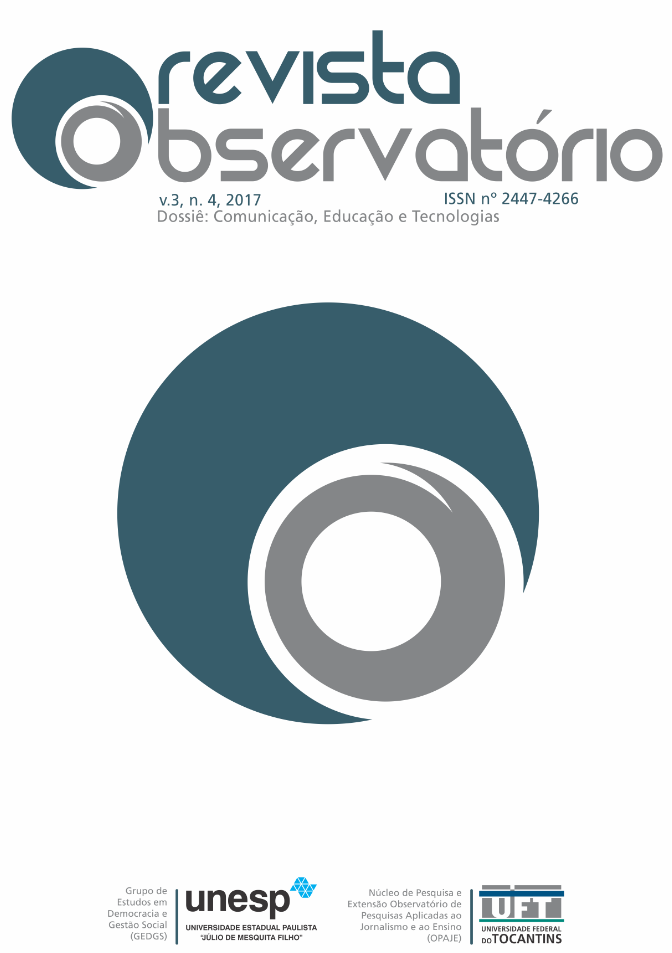ON REVISION IN WRITING: a demanding management of the relationship between reader, writer and written text
DOI:
https://doi.org/10.20873/uft.2447-4266.2017v3n4p488Keywords:
revision, recursion, self-revision, professional revision, readerAbstract
The choice of the most appropriate terms for specific concepts is no easy task. Sommers (1978) mentioned that, because of the urgent need to explore a view of writing as a process, no thought was given to finding new terminology, an omission from which the permanence of the term “revision” was established, running the risk of revision continuing to be seen as the last stage in linear writing. This article intends to explore the recursive potential of “revision” in writing, in what it means as 1) checking the expected isomorphism between what is meant to be said and that which is put into writing, so that communication can be at its best; 2) acting at different levels, taking account, or not, of the audience; 3) conjugating what it is with how it is transmitted; 4) distinguishing between self-revision and professional revision; and 5) a culture of a distancing by the reader regarding the written material.
Downloads
References
ALEXANDROV, Andrei V. How to write a research paper. Cerebrovascular Diseases, vol. 18, 2004, p. 135-138.
ALLAL, Linda; CHANQUOY, Lucile. Introduction. Revision revisited. In: ALLAL, Linda; CHANQUOY, Lucile; LARGY, Pierre (Eds.). Revision. Cognitive and instructional processes. Boston: Kluwer Academic Publishers, 2004, p. 1-7.
ATKINSON, Dwight. Writing and culture in the post-process era. Journal of Second Language Writing, vol. 12, 2003, p. 49-63.
BISAILLON, Jocelyne, Sur les traces d’un réviseur professionnel d’expérience. In: BISAILLON, Jocelyne (sous la direction de). La révision professionnelle: processus, stratégies et pratiques. Canada: Édtions Nota Bene, 2007a, p. 49-73.
BISAILLON, Jocelyne. Professional editing strategies used by six editors. Written Communication, v. 24, n. 4, 2007b, p. 295-322.
BOULINIER, Michelle. Le rythme et l’espace chez l’être humain. Lettre d’Information de l’Association Langage Lecture Orthographe, n. 7, oct. 1989, p. 3-4.
BURROUGH-BOENISCH, Joy. International reading strategies for IMRD articles. Written Communication, vol. 16, n. 3, 1999, p. 296-316.
CLOUTIER, Francine. La clarté : pour qui? Recherches en Rédaction Professionnelle, vol. 1, n. 1, 2001, p. 1-9.
FAIGLEY, Lester. Competing theories of process: a critique and a proposal. College English, v. 48, n. 6, 1986, p. 527-542.
FITZGERALD, Jill. Research on revision in writing. Review of Educational Research, v. 57, n. 4, 1987, p. 481-506.
HAYES, John R.; FLOWER, Linda; SCHRIVER, Karen A.; STRATMAN, James F.; CAREY, Linda. Cognitive processes in revision. In: ROSENBERG, S. (Ed.). Reading, writing, and language processes. Cambridge, England: Cambridge University Press, 1987, p. 176-240.
HOLLIWAY, David R.; MCCUTCHEN, Deborah. Audience perspective in young writers’ composing and revising. Reading as the reader. In: ALLAL, Linda; CHANQUOY, Lucile; LARGY, Pierre (Eds.). Revision. Cognitive and instructional processes. Boston: Kluwer Academic Publishers, 2004, p. 87-101.
HOLSANOVA, Jana; HOLMQVIST, Kenneth; RAHM, Henrik. Entry points and reading paths on newspapers spreads: comparing a semiotic analysis with eye-tracking measurements. Visual Communication, vol. 5, n. 1, 2006, p. 65-93. Sage Publications.
LANHAM, Richard, A. Revising prose. Fifth editon. New York: Pearson Longman. 2006.
LIBRA, Judy A. How to Write a Paper. Introduction to Scientific Work Seminar, Module 6. International Study Course Environmental and Resource Management, Brandenburg Technical University Cottbus, Germany 2001.
MIŚAK, Aleksandra; MARUŚIĆ, Matko; MARUŚIĆ, Ana. 2005. Manuscript editing as a way of teaching academic writing: Experience from a small scientific journal. Journal of Second Language Writing, vol. 14, 2005, p. 122-131.
MURRAY, Donald M. The craft of revision. Fifth Anniversary Edition. Boston: Wadsworth Cengage Learning, 2013.
NWOGU, Kevin N. The medical research paper: Structure and functions. English for Specific Purposes, vol.16, n. 2, 1997, p. 119–138.
ODELL, Lee. Teaching writing by teaching the process of discovery: an interdisciplinary enterprise. In: GREGG, Lee W.; STEINBERG, Erwin R. (Eds.). Cognitive processes in writing. Hillsdale, New Jersey: Lawrence Erlbaum Associates, Publishers, 1980, p. 139-154.
OLSON, David R. The world on paper. The conceptual and cognitive implications of writing and reading. Cambridge: Cambridge University Press. 1994.
OLSON, David R.; OATLEY, Keith. The quotation theory of writing. Written Communication, vol. 31, n. 1, 2014, p. 4-26.
ROUSSEY, Jean-Yves; PIOLAT, Annie. Critical Reading effort during text revision. European Journal of Cognitive Psychology, vol. 20, n. 4, 2008, p. 765-792.
ROHMAN, D. Gordon. The stage of discovery in the writing process. College Composition and Communication, vol. 16, n. 2, 1965, p. 106-112.
SHAFTO, Meredith A. Proofreading in young and older adults: the effect of error category and comprehension difficulty. Int. J. Environ. Res. Public Health, vol. 12, 2015, p. 14445-14460.
SOLLACI, Luciana B.; PEREIRA, Mauricio G. The introduction, methods, results, and discussion (IMRAD) structure: a fifty-year survey. J Med Libr Assoc, vol. 92, n. 3, 2004, p. 364-367.
SOMMERS, Nancy. Response to Sharon Crowley, “Components of the composing process”. College Composition and Communication, vol. 29, n. 2, 1978, p. 209-211.
VANDENDAELE, Astrid; DE CUYPERE, Ludovic; VAN PRAET, Ellen. Beyond “trimming the fat”: The sub-editing stage of newswriting. Written Communication, vol. 37, n. 4, 2015, p. 368-395.
Downloads
Published
How to Cite
Issue
Section
License
[PT] Autores que publicam nesta revista concordam com os seguintes termos:
1. Autores mantém os direitos autorais e concedem à revista, sem pagamento, o direito de primeira publicação, com o trabalho simultaneamente licenciado sob a Creative Commons Attribution License (CC BY-NC 4.0), permitindo o compartilhamento do trabalho com reconhecimento da autoria do trabalho e publicação inicial nesta revista.
Leia todos os termos dos direitos autorais aqui.

